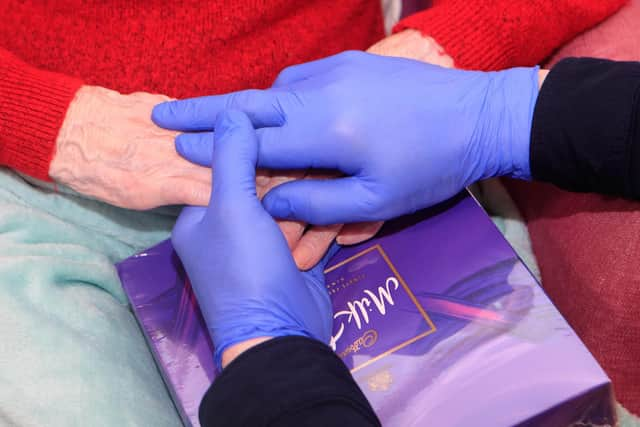Covid Scotland: 14 care homes had some of highest deaths and complaints, now we must ask why
In total, just 122 complaints were escalated to a full investigation by the regulator, down from around 600 in previous years.
This is not to say complaints were not looked at by the regulator, which found itself between a rock and a hard place.


Advertisement
Hide AdAdvertisement
Hide AdIn balancing the requirement to continue scrutinising the sector with reducing the risk to residents from in-person inspections, the decision was made to significantly limit the number of full investigations.
Instead, hundreds of complaints were noted for “intelligence” or involved discussion with providers, rather than a full investigation.
Of the 51 care homes with more than ten complaints in the past year (just 8 per cent of care homes with a complaint had ten or more), 14 – or 27 per cent – also saw more than 20 Covid-19 deaths, according to data from the National Records of Scotland.
Just 29 care homes across Scotland suffered more than 20 deaths, meaning almost half of the worst-hit care homes in Scotland by the pandemic had some of the highest complaint rates in the country.
These were Northcare Manor, Braid Hills Nursing Centre, and Victoria Manor Nursing Home in Edinburgh, Erskine Home, Braemount Nursing Home, and Elderslie Care Home in Renfrewshire, as well as Rutherglen Care Home and Whitehills Care Home in South Lanarkshire.
The other care homes were Orchard Care Centre in Clackmannanshire, Westerton Care Home in East Dunbartonshire, Hillview Care Home in West Dunbartonshire, Caledonian Court Care Home in Falkirk, Ailsa Craig in Glasgow, and Drummond Grange Nursing Home in Midlothian.
The number of complaints received by a care home and the number of deaths recorded under Covid-19 is not necessarily an indication of sub-standard care.
Many factors, including the size of the care home, potential issues other than below-par care such as communication and lack of contact sparking a complaint, can affect these raw numbers.
Advertisement
Hide AdAdvertisement
Hide AdThe Care Inspectorate said each of the 14 care homes were subject to a “full unannounced inspection in the past year, some more than once”.
It added: “Inspections take account of all concerns raised with us. Reports of all our inspections are published on our website and summary reports are laid before the Scottish Parliament.
"The Care Inspectorate continually reviews our learning and experience across all our work to improve how we support care services.
"We know that any care service can be affected by Covid-19 and that residents of care homes were tragically particularly vulnerable to the virus. We also know that the quality of care experienced by residents did not necessarily provide an indicator of the risks in relation to the virus.”
Due to the scale of the Covid-19 tragedy in care homes, families of the dead will understandably still have questions.
Nicola Sturgeon’s government has committed to a full public inquiry into Scotland’s handling of the pandemic, but the political desire for answers specifically in the care home sector should not be limited to a footnote in that examination of wider failures.
A specific care home inquiry should be held and, included in it, should be an examination of the conduct of the Care Inspectorate.
Was the decision to limit in-person inspections and more in-depth investigations ultimately one that saved lives in Scottish care homes?
Advertisement
Hide AdAdvertisement
Hide AdOr did it instead lead to problems with infection control left unnoticed until too late?
Above all else, it is clear the staff in care homes and family members of those who died in the pandemic will be forever scarred by the experience of caring and losing their patients and relatives.
A message from the Editor:
Thank you for reading this article. We're more reliant on your support than ever as the shift in consumer habits brought about by coronavirus impacts our advertisers.
If you haven't already, please consider supporting our trusted, fact-checked journalism by taking out a digital subscription.
Comments
Want to join the conversation? Please or to comment on this article.
